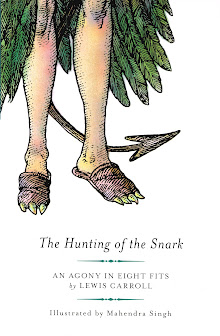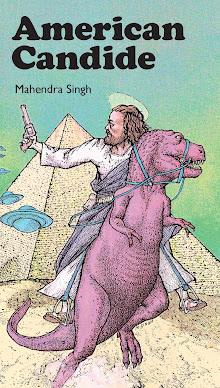
Then a scream, shrill and high, rent the shuddering sky,
And they knew that some danger was near:
The Beaver turned pale to the tip of its tail,
And even the Butcher felt queer.
It’s all very fine and well reading Lewis Carroll’s Hunting of the Snark in the comfort of your favorite overstuffed charpoy before a roaring fire, an overstuffed tumbler of roaring brandy at your ready disposal, perhaps even your faithful Assamese nautch girl parked at your slippered feet. Oh yes, you feel quite cozy and secure, idly turning the pages, chuckling wryly at some particularly droll anapaest, perhaps even lingering upon a picture … perhaps even the very picture we see above …
Hmm, you say to yourself, as your Assamese nautch girl adroitly pushes aside your fashionably retrograde moustache to slip another morsel of Snark curry between your lips and then resumes her languid, opium-scented contortions of enigmatic Oriental purpose; yes, hmm, you say, what’s all this then, eh?
Well, it’s a fair cop! Speaking for myself, the proprietor of the above-mentioned assemblage of dots, squiggles and lines, I can assure you that it means quite a good deal — to the Beaver and the Butcher, the poor things!
Oh yes, you can cultivate all the insouciance you like, go ahead — it probably suits you! Be a mocky mocker and make light of their cheap second-hand Victorian hand-me-down clothes and their penchant for overwrought music-hall histrionics!
Tell ‘em that it’s all in their head, tell ‘em that it’s just a cheap bit of sleight of hand from some hopelessly fusty and uncool Victorian parlor game, that’s a good start! You could also poke a stick in the eye of Mr. Carroll’s scream-cum-shuddering-sky trope. Are not the honest, simple fear-mongering kennings of Ye Olde English Nonsense Verse good enough for Mister Carroll anymore? Good lord, man, leave the trisyllabic, sibilant-ridden adjectives of doom to Paul Bowles and his ilk, eschew all this shuddering and sheltering sky crosstalk before someone gets hurt!
Yes, you could say all that and even more but at that very moment, in an unexpected and stormy manner reminiscent of last season’s cliffhanger installment of the Book of Genesis, the rightful owner of the charpoy that you have parked yourself upon has appeared to reclaim his rightful place! An instant later, your Assamese nautch girl and you are precipitiously ejected from the premises, shame-faced perhaps, feeling a bit pale and queer even, as you should be!
Perhaps now you could favor us with a little scream, something redolent of a frightened Snark Hunter caught cucumberless in the salad season? Please try to make it as high and shrill as possible, this is your long overdue Expulsion From Paradise and we must keep up appearances!










